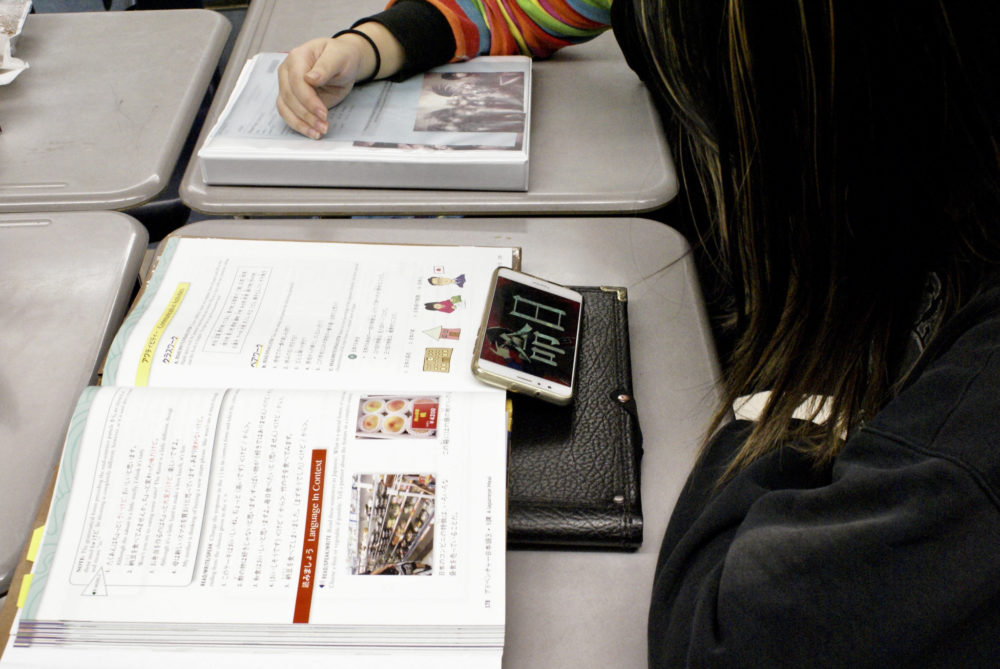
By Jennifer Trend, Staff Writer
Mastering a language is a hard task no matter the dialect. However, listening to music of that language can provide an opportunity to not only gain experience in your understanding and comprehension but also an insight into the country’s culture.
Teachers from all three world languages here at Fountain Valley High School (FVHS) all agree- that music can help a student improve. It’s no wonder why they play a variety of music and have students sing in their classes. From popular music in the country to catchy tunes to help remember days of the week or counters, music is a considerable part of a student’s learning experience in a language at FVHS.
Department Coordinator for the World Language Department and Spanish Two and Advanced Placement (AP) teacher Jim Diecidue said, “We also have songs that are made for students that are just fun little [songs]- like in Spanish we have… our hip-hop songs that sometimes have funny little ways to remember.”
The more of a song that can get stuck in your head and the more it repeats, it is the more likely to be able to retain the words of the song and perhaps the meaning. In a way, it helps to study subconsciously without needing to be constantly playing music to remember it.
Music can help the memorization of different words and slang, along with how natives pronounce certain words embedded in a part of the language culture.
“And it’s kind of a low-risk speaking or singing opportunity,” said Ashley Houlette, French One, Three, Four and AP teacher. “So you can use the language with a native speaker at the same time by singing along without feeling vulnerable or exposed.”
Music also familiarizes the culture, values and perspectives, getting an insight into different messages the singers express in their music.
“French people, in general, tend to really like talking about politics. And a lot of French rap has political lyrics, or targets political topics… [and] deals with issues of racial inequality or events that are happening in real life,” said Houlette.
With pop culture on the rise, Saori Tanaka, Japanese One, Three and Four/AP teacher, recommends Japanese Pop (J-POP) given its popularity and how much of an influence it has on teens and young adults.
However, listening to music can only help so much but there are multiple ways to not only help with the understanding of the language but how to speak and read it. From singing along to reading the lyrics, it is always possible to improve in a language.
Houlette recommends singing along with the lyrics and as the song becomes familiar, gradually start looking away or covering up some of the lyrics. So eventually, reading the lyrics will not be necessary.
LyricsTraining, an app and website that has fill in the blanks for lyrics from select songs, has difficulties ranging from beginner to expert.
“LyricsTraining is good, and I think karaoke is very good. In LyricsTraining and in karaoke there is a selection and so if you do that and practice I think that is very good,” said Tanaka. “[Also,] when you listen to music, there are lyrics, and so if you listen to the song while reading the lyrics, I think that is really good.”
The best part about listening to songs of different languages is that with the internet there are an unlimited amount of sites to visit to play music. From Spotify, YouTube, LyricsTraining, Pandora and iTunes, it’s easy to plug in some headphones (or the aux cord) and play something. Even if it’s just a few songs every day, it can aid in learning the language with noticeable results.
“I’ve had some students who have really taken that advice of finding music that they like and they’ve gotten in the habit of listening to Spanish music regularly in the car, on their phone, wherever, and I have seen it make a difference,” said Diecidue. “Some of them, I’ve seen some really strong students who actually credit their success in Spanish to having really gotten into music in Spanish. It can make a big difference.”





